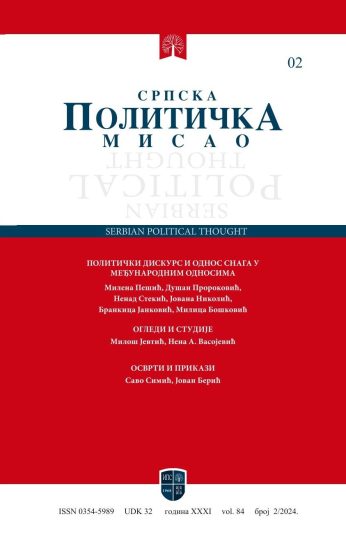Тема броја
Српска политичка мисао
Electoral Management in the Western Balkans – Overview of Institutional Setting
Сажетак
Countries of the Western Balkans (WB) – former federal units of Socialist Federal Republic of Yugoslavia and Albania have undergone a lengthy and complex process of democratisation from late 1980s. Free and fair elections are among the cornerstones of democratic consolidation. Even though the institutional setting for electoral management differs greatly across the globe, during the Europeanisation process it was widely recommended to transitional societies to set up independent electoral management bodies in other to guarantee fair electoral conditions, with standards mostly promoted by the Venice Commission of the Council of Europe (VC) and International Institute for Democracy and Electoral Assistance (IDEA). Based on this influence, all the countries of the WB have established electoral commissions that are to great extent formally independent from the executive, with the intention of being less prone to electoral meddling. This is enhanced by regular election monitoring in the region by the Organisation for Security and Cooperation in Europe (OSCE) and the process being followed and evaluated by both the European Union institutions and member states as part of fulfilment of the Copenhagen criteria to join the EU. This paper gives an overview of the institutional setting of electoral management in the WB that was created following the model of independent bodies and outlines main features of their design.
Референце
- Aaken, A. v. (2009) “Independent electoral management bodies and international election observer missions: any impact on the observed level of democracy? A conceptual framework”, Const Polit Econ, 20: 296-322.
- ACE. Topic areas. The Electoral Knowledge Network. Available at: http://aceproject.org/ace-en/topics [10.3.2019]
- Al-Musbeh, M. (2011) “Managing Elections: Definition and Classification of Election Management Bodies”. Available at: https://ssrn.com/abstract=2271279 [10.3.2019]
- Bardutzky, S. (2010). The Strasbourg Court on the Dayton Constitution: Judgment in the case of Sejdić and Finci v. Bosnia and Herzegovina, 22 December 2009. European Constitutional Law Review, 6(2): 309-333.
- BiEPAG. The Crisis of Democracy in the Western Balkans. Authoritarianism and EU Stabilitocracy. Balkans in Europe Policy Advisory Group. Available at: https://biepag.eu/wp-content/uploads/2017/03/BIEPAG-The-Crisis-of-Democracy-in-the-Western-Balkans.-Authoritarianism-and-EU-Stabilitocracy-web.pdf [10.3.2019]
- Catt, H. et al. (2014) “Electoral Management Design”. IDEA, Available at: https://www.idea.int/sites/default/files/publications/electoral-management-design-2014.pdf [10.3.2019]
- Elklit, J.; Reynolds, A. (2002) “The Impact of Election Administration on the Legitimacy of Emerging Democracies: A New Comparative Politics Research Agenda”. Commonwealth & Comparative Politics, 40: 86-119.
- Giandomenico, J. (2013) “EU conditionality as a transforming power in Macedonia – Evidence from electoral management” in: E. Albasani, European Integration and Transformation in the Western Balkans Europeanization or business as usual?, Routledge, 70-84.
- Hadžiabdić, I. “Case study: Bosnia and Herzegovina: The Challenges of an Independent EMB Model”. The Electoral Knowledge Network. Available at: http://aceproject.org/ace-en/topics/em/annex/electoral-management-case-studies/bosnia-and-herzegovina-a-success-story-for-the. [10.3.2019]
- Ham, C. v.; Lindberg, S. (2015) “When Guardians Matter Most:Exploring the Conditions Under Which Electoral Management Body Institutional Design Affects Election Integrity”, Irish Political Studies, 30: 454-481.
- Jeffrey, K. et al. (2017) “Professional Electoral Management: Building Capacity”. The Electoral Integrity Project, University of Sydney.
- Kumar, K. (1998) Postconflict Elections, Democratization, and International Assistance. London: Lynne Rienner Publishers.
- Lopez-Pintor, R. (2000) “Electoral Management Bodies as Institutions of Governance”. Bureau for Development Policy United Nations Development Programme, Available at: http://www.eods.eu/library/UNDP.Electoral%20Management%20Bodies%20as%20Institutions%20of%20Governance.pdf [10.3.2019]
- Merkel, W. (2010) “Are dictatorships returning? Revisiting the ‘democratic rollback’ hypothesis”. Contemporary Politics, 16:17-31.
- Milenković, M. (2018) “The Transformation of State Aid Control in Serbia and EU Conditionality – Challenges of Integration Uncertainty and Reform Prospects”. European State Aid Law Quarterly. 15(1): 66-79.
- Milenković, M. (2018) “The institutional setting for state aid control in Serbia and the long road to “operational independence”, Serbian Political Thought. 18(2):69 – 87.
- Mozaffar, S; Schedler, A (2002) “The Comparative Study of Electoral Governance—Introduction”. International Political Science Review, 23: 5-27.
- Pollitt, C.; Bathgate, K.; Caulfield, J.; Smullen, A.; Talbot, C. (2001) “Agency Fever? Analysis of an International Policy Fashion”, Journal of Comparative Policy Analysis: Research and Practice, 3:271-290.
- Trebilcock, M.; Chitalkar, P. (2009) “From Nominal to Substantive Democracy: The Role and Design of Election Management Bodies”. The Law and Development Review, 2:191-224.
- Vuković, I. (2015) “Political dynamics of the post-communist Montenegro: one-party show”. Democratization. 22(1):73-91.

